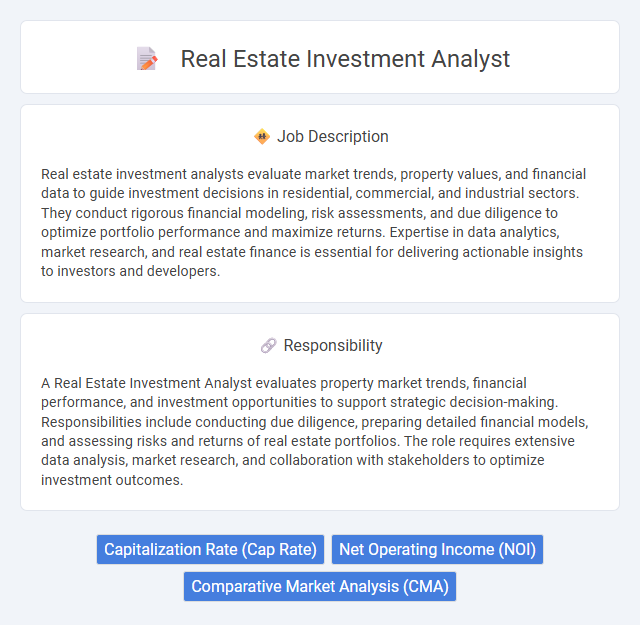
Real estate investment analysts evaluate market trends, property values, and financial data to guide investment decisions in residential, commercial, and industrial sectors. They conduct rigorous financial modeling, risk assessments, and due diligence to optimize portfolio performance and maximize returns. Expertise in data analytics, market research, and real estate finance is essential for delivering actionable insights to investors and developers.
People with strong analytical skills and an interest in market trends are likely suitable for a real estate investment analyst role, as the job often requires detailed financial modeling and data interpretation. Those who are comfortable working with numbers and can handle pressure in a fast-paced environment may find this position aligns well with their capabilities. Candidates lacking attention to detail or unwilling to engage in continuous learning about market conditions might find this role challenging.
Qualification
Real estate investment analysts require a strong foundation in finance, economics, and real estate markets, typically demonstrated by a bachelor's degree in finance, real estate, or business administration. Proficiency in financial modeling, data analysis, and tools like Excel, Argus, and GIS software is essential for evaluating property investment opportunities. Certifications such as CFA, CCIM, or real estate licenses enhance credibility and signal expertise in market analysis, risk assessment, and portfolio management.
Responsibility
A Real Estate Investment Analyst evaluates property market trends, financial performance, and investment opportunities to support strategic decision-making. Responsibilities include conducting due diligence, preparing detailed financial models, and assessing risks and returns of real estate portfolios. The role requires extensive data analysis, market research, and collaboration with stakeholders to optimize investment outcomes.
Benefit
Real estate investment analysts likely benefit from gaining deep insights into market trends and property valuation, enhancing their decision-making skills. Their work probably leads to improved investment strategies that maximize return on investment and minimize risk. Exposure to diverse real estate portfolios may increase their expertise, making them valuable assets in competitive financial markets.
Challenge
Real estate investment analyst roles often face the challenge of accurately predicting market trends amid economic volatility. The complexity of analyzing diverse property types and financial models increases the probability of requiring advanced analytical skills and adaptability. Navigating regulatory changes and fluctuating demand further complicates decision-making processes in this position.
Career Advancement
Real estate investment analysts play a crucial role in assessing property market trends, financial data, and investment opportunities to guide strategic decisions. Career advancement in this field often involves progressing to senior analyst roles, portfolio management, or positions such as real estate asset manager and investment director. Developing expertise in financial modeling, market research, and negotiation skills significantly enhances promotion prospects within real estate investment firms.
Key Terms
Capitalization Rate (Cap Rate)
A Real Estate Investment Analyst evaluates properties by analyzing the Capitalization Rate (Cap Rate), which calculates the ratio of net operating income to property asset value, providing critical insight into investment returns. Accurate Cap Rate assessment informs risk evaluation and comparative market analysis, enabling strategic portfolio optimization. Mastery of Cap Rate interpretation impacts financial forecasting and decision-making in property acquisitions and dispositions.
Net Operating Income (NOI)
A real estate investment analyst evaluates properties by meticulously calculating Net Operating Income (NOI), a critical metric derived from total revenue minus operating expenses, excluding taxes and financing costs. Accurate NOI assessments enable analysts to forecast property profitability, inform acquisition decisions, and optimize portfolio performance. Mastery of NOI analysis supports strategic investment planning, risk management, and value maximization in the commercial and residential real estate markets.
Comparative Market Analysis (CMA)
A Real Estate Investment Analyst specializing in Comparative Market Analysis (CMA) evaluates property values by systematically comparing similar properties within a specific market to identify trends, price points, and potential investment opportunities. Utilizing data on recent sales, market trends, and property features, the analyst provides accurate valuations that inform strategic investment decisions and risk assessments. Mastery of CMA techniques enables the analyst to deliver actionable insights that optimize portfolio performance and maximize returns in competitive real estate markets.
 kuljobs.com
kuljobs.com